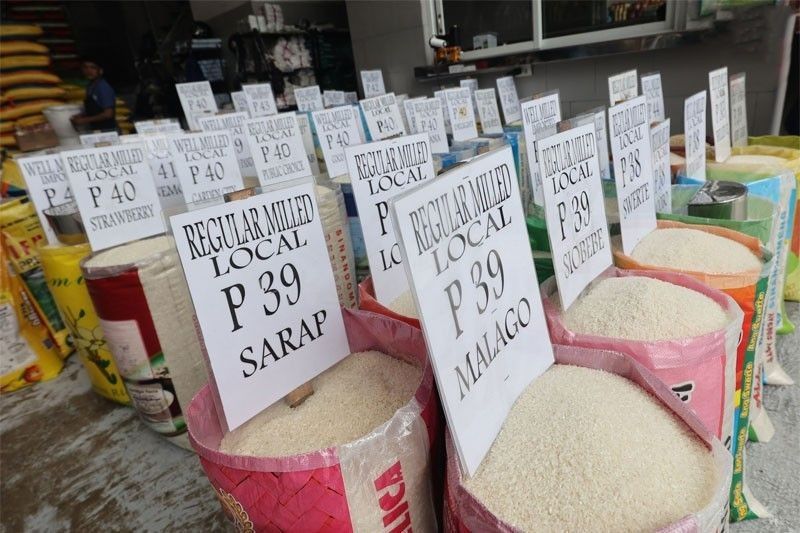DTI: Rice price cap may last for a month

MANILA, Philippines — The government is hoping that the imposition of the price ceiling on rice will not go beyond one month as it expects prices of the staple food to stabilize in three weeks, according to an official of the Department of Trade and Industry (DTI).
In an interview with radio dzBB yesterday, DTI Assistant Secretary Agaton Uvero said the government hopes that the implementation of the price ceiling on rice under Executive Order No. 39, which took effect last Tuesday, will not exceed one month.
“But it depends on … the results (of the implementation) in the market,” he said in Filipino. “We see that in three weeks time, the price will be a bit stable already.”
Under the EO, the price ceiling for regular-milled rice is set at P41 per kilo, while well-milled rice is at P45 per kilo.?Based on the DTI’s price monitoring operations, many retailers have complied with the price ceiling.
When the harvest season starts in a few weeks, the local supply of rice is seen to increase, which will bring down rice prices, according to Uvero.?He reiterated that the price ceiling does not cover premium rice.
Meanwhile, the DTI is validating the list of retailers affected by the price ceiling’s implementation so that they can receive financial assistance from the Department of Social Welfare and Development (DSWD), he said.
The DTI official expressed hope that the distribution of financial assistance will begin this week.
“Our target is before the week ends – the DSWD will begin the distribution of the assistance,” he said at the Laging Handa briefing yesterday.
He added that the financial assistance is expected to be around P15,000 per retailer.
The DTI earlier said it has started the profiling of rice retailers that have been affected by the rice price ceiling implementation as the government prepares the financial aid.
Uvero said the DTI, together with the Department of Agriculture (DA), is collecting all the names of the retailers affected by the imposed rice price ceiling. The collected names would be forwarded to the DSWD.
The DTI said it would implement various forms of assistance to rice retailers/wholesalers, including small supermarkets that will be affected by the price ceiling, in coordination with other government agencies and stakeholders.
These include financial assistance, loan programs, logistics support and market linkages and support.
It added that the government would likewise provide transportation in delivering rice from traders to retailers to reduce logistical costs.
Market linkages will also be established to link local farmers with supermarket chains and other retailers and promote bulk buying or advance purchase of supermarkets, restaurants, hotels, resorts and other commercial establishments.
Not enough
For farmers’ group Samahang Industriya ng Agrikultura (SINAG) chairman Rosendo So, the P15,000 assistance to rice retailers affected by EO 39 is not enough, saying vendors shoulder loss of at least P500 per sack because of the price ceiling.
“Our appeal is that the subsidy should be increased so that retailers will not suffer big losses,” So said in a radio interview yesterday, noting a retailer sells at least 30 bags daily and that these rice stocks are bought at higher prices.
“The P15,000 is too little if a retailer loses P500 per sack,” So said.
The SINAG official mentioned that Northern Luzon millers started to deliver P43 per kilo of rice to retailers last Tuesday.
He added that the farmgate price of palay ranged between P23 and P25 per kilo.
The rice price ceiling should be lifted after one month as the peak of the palay harvest is expected next month, according to So.?“Based on our projection, by Oct. 15, or one month and 10 days, the farmgate price of palay will reach P22 and P23 (per kilo). The retail prices of rice are expected to go down to P43, P44 per kilo,” he said.
He added that farmers could earn P50,000 per hectare if the farmgate price of palay will remain at P22 and P23 per kilo, which “net income is higher compared to the P35,000 to P40,000 (income) of farmers during the last harvest.”
Compliance
Rice retailers’ group Grains Retailers Confederation of the Philippines (GRECON) vowed compliance with EO 39, but stressed that it should be temporary.
In a radio interview yesterday, GRECON national president James Magbanua disclosed that he would meet with his group’s regional leaders to explain the current situation.
“The national government assured assistance to our retailers, so negative reaction was lessened. I have yet to talk to all. I have a meeting on Thursday in Luzon area, the presidents of different regions, to explain to them,” he said.
He added that GRECON has more than 65,000 member-retailers nationwide.
While retailers were surprised by the EO issued by President Marcos, they will obey the decision as responsible citizens, according to Magbanua.
The Department of Budget and Management will likely tap contingent funds to provide assistance to rice retailers following the imposition of price cap on the commodity.
Budget Secretary Amenah Pangandaman said the DBM has yet to receive requests from concerned state agencies on the funding requirement for assistance.
“We will wait for the request of the implementing agency,” Pangandaman said in a Viber message to The STAR. “I really don’t know which department because I just saw the statements of the Speaker (Martin Romualdez).”
This came after Romualdez directed a committee of the House of Representatives to find ways to allocate P2 billion to help retailers cope with possible losses.
“I think they will still study how the distribution will be and who will be the beneficiaries,” Pangandaman said. “If it’s with the DSWD, I think they still have existing funds. Otherwise, we can tap possible standby funds, like contingent funds.”
‘Sell despite losses’
Rice retailers in San Jose City, Nueva Ecija city have been advised to sell their stocks even if they would incur losses in view of the price cap imposition last Tuesday.
“It doesn’t matter if you incur losses a bit for the meantime, you’ve already earned before, anyway,” Mayor Mario Salvador said in Filipino last Monday, addressing retailers who sought his guidance.
“They were asking me if they should open, I told them, if they don’t open, where would they get food from?” Salvador added.
San Jose City is home to at least 30 rice mill establishments that sell grains to Metro Manila and various parts of the country.
Amid these developments, the government will heighten monitoring of rice prices in the market as inflation accelerated to 5.3 percent last month, Malacañang said yesterday.
The National Economic and Development Authority (NEDA) attributed the increase in the August inflation to the soaring prices of the staple food.
Meanwhile, hoarding, profiteering and cartel of agricultural products have been recommended by joint Senate committees to be included in the economic sabotage, a non-bailable offense.
Sen. Cynthia Villar, who chairs the Senate committee on agriculture, is hopeful that that proposed measure will soon be passed in the Senate.
Joint Senate committees recommended the repeal of Republic Act 10845, or the Anti-Agricultural Smuggling Act of 2016, as part of the effort to address “rampant and unabated” agricultural smuggling in the country, which has greatly affected farmers, fisherfolk and consumers. – Louise Maureen Simeon, Ric Sapnu, Helen Flores, Cecille Suerte Felipe
- Latest
- Trending





























